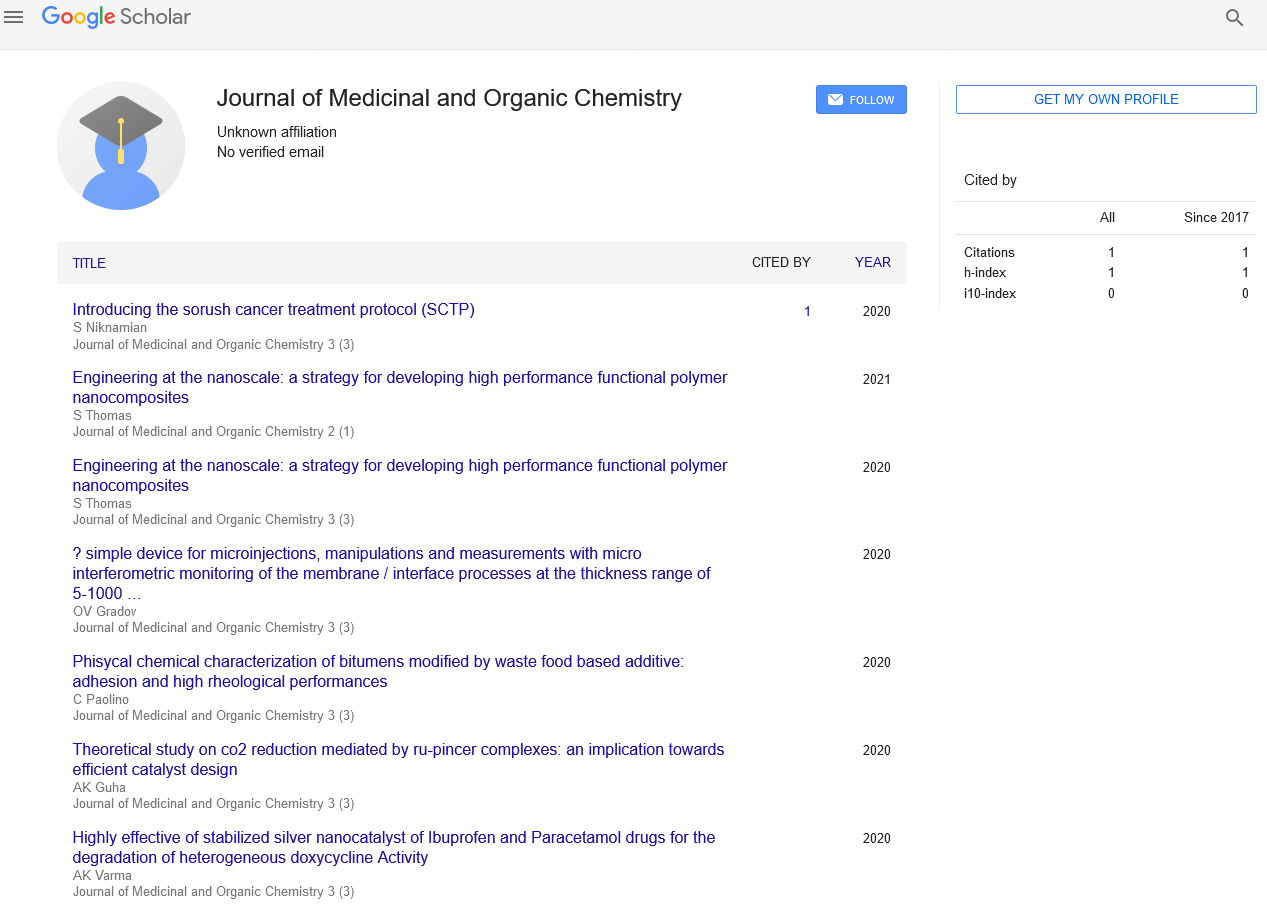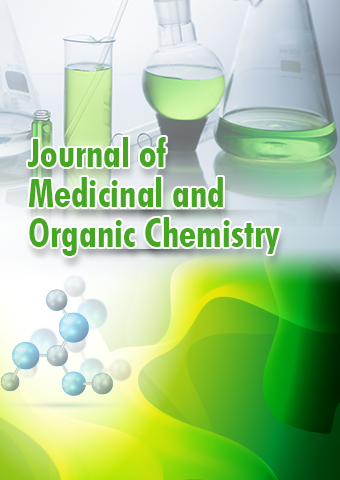Perspective - Journal of Medicinal and Organic Chemistry (2024) Volume 7, Issue 5
Medicinal Procedures: Transforming Patient Care
- Corresponding Author:
- Gregory Feng
Department of Medicine,
University of Hrendse,
Odense,
Denmark
E-mail: gregory.feng@uhn.ca
Received: 03-Jul-2024, Manuscript No. JMOC-24-140596; Editor assigned: 08-Jul-2024, PreQC No. JMOC-24-140596 (PQ); Reviewed: 22-Jul-2024, QC No. JMOC-24-140596; Revised: 01- Oct-2024, Manuscript No. JMOC-24-140596 (R); Published: 29-Oct-2024, DOI: 10.37532/jmoc.2024.7(5).247-248
Introduction
In the realm of modern medicine, advancements in medicinal procedures have revolutionized the way healthcare professional diagnose, treat and manage various health conditions. These innovations span a range of techniques, from minimally invasive surgeries to cutting-edge imaging technologies, significantly enhancing patient outcomes and overall quality of care. This article explores some of the key medicinal procedures that have transformed patient care, highlighting their benefits, applications and future potential.
Description
Minimally invasive surgeries
Minimally Invasive Surgeries (MIS) have redefined surgical practices by reducing the physical trauma associated with traditional open surgeries. Techniques such as laparoscopy, endoscopy and robotic-assisted surgery involve smaller incisions, leading to reduced pain, faster recovery times and lower risk of complications. For instance, laparoscopic cholecystectomy, the removal of the gallbladder, is now commonly performed using small incisions and a camera, allowing patients to recover quickly and return to normal activities within days.
Robotic-assisted surgery, another breakthrough in MIS, offers enhanced precision and control. The da Vinci surgical system, for example, allows surgeons to perform complex procedures with greater accuracy through tiny incisions. This technology is particularly beneficial in delicate surgeries such as prostatectomies and cardiac valve repairs, where precision is paramount.
Advanced imaging techniques
The evolution of imaging technologies has been pivotal in improving diagnostic accuracy and guiding treatment decisions. Magnetic Resonance Imaging (MRI), Computed Tomography (CT) scans and Positron Emission Tomography (PET) scans have become indispensable tools in modern medicine. These techniques provide detailed, cross-sectional images of the body’s internal structures, enabling early detection of diseases such as cancer, cardiovascular conditions and neurological disorders.
Functional MRI (fMRI) represents a significant advancement in neuroimaging, allowing researchers and clinicians to observe brain activity in real-time. This technique has profound implications for understanding brain function and diagnosing neurological disorders, such as alzheimer’s disease and epilepsy. Moreover, the integration of Artificial Intelligence (AI) in imaging analysis is enhancing the accuracy of diagnoses, helping radiologists detect anomalies that might be missed by the human eye.
Precision medicine and genomics
Precision medicine tailors medical treatment to the individual characteristics of each patient, considering genetic, environmental and lifestyle factors. This approach has gained momentum with advancements in genomics, enabling the identification of genetic mutations associated with various diseases. For instance, genetic testing for BRCA1 and BRCA2 mutations has become a standard practice in assessing breast and ovarian cancer risk, allowing for personalized preventive measures and treatment plans.
Pharmacogenomics, a subset of precision medicine, examines how an individual’s genetic makeup influences their response to drugs. This field has led to the development of targeted therapies, particularly in oncology. Medications like trastuzumab (Herceptin) for HER2-positive breast cancer and imatinib (Gleevec) for chronic myeloid leukemia have revolutionized cancer treatment by specifically targeting cancer cells while sparing healthy tissues.
Regenerative medicine and stem cell therapy
Regenerative medicine and stem cell therapy hold immense promise in repairing damaged tissues and organs, offering potential cures for conditions previously deemed incurable. Stem cells, with their ability to differentiate into various cell types, have shown remarkable potential in treating diseases such as parkinson’s disease, spinal cord injuries and heart disease.
One notable application of regenerative medicine is in orthopedics, where stem cell therapy is used to treat joint injuries and osteoarthritis. By injecting stem cells into damaged joints, clinicians can stimulate the growth of new cartilage and alleviate pain, reducing the need for joint replacement surgeries. Similarly, in cardiology, researchers are exploring the use of stem cells to regenerate damaged heart tissue following a heart attack, potentially restoring normal cardiac function.
Immunotherapy
Immunotherapy has emerged as a groundbreaking approach in the treatment of cancer and other immune-related disorders. By harnessing the body’s immune system to target and destroy cancer cells, immunotherapy has shown remarkable success in treating certain types of cancer, including melanoma, lung cancer and lymphoma.
Checkpoint inhibitors, a type of immunotherapy, work by blocking proteins that prevent immune cells from attacking cancer cells. Drugs such as pembrolizumab (Keytruda) and nivolumab (Opdivo) have demonstrated significant efficacy in patients with advanced cancers, leading to prolonged survival and in some cases, complete remission.
CAR-T cell therapy, another innovative form of immunotherapy, involves modifying a patient’s T cells to express Chimeric Antigen Receptors (CARs) that can specifically target cancer cells. This personalized treatment has shown remarkable success in treating certain blood cancers, such as Acute Lymphoblastic Leukemia (ALL) and Diffuse Large B-Cell Lymphoma (DLBCL), providing new hope for patients with otherwise limited treatment options.
Conclusion
The continuous evolution of medicinal procedures is revolutionizing patient care, offering new hope and improved outcomes for individuals across the globe. From minimally invasive surgeries and advanced imaging techniques to precision medicine and regenerative therapies, these innovations are reshaping the healthcare landscape. As technology continues to advance, the future of medicine holds even greater promise, with the potential to further enhance diagnostic accuracy, treatment efficacy and patient experiences. Embracing these advancements and integrating them into clinical practice will be crucial in realizing the full potential of modern medicine and improving the health and well-being of individuals worldwide.

